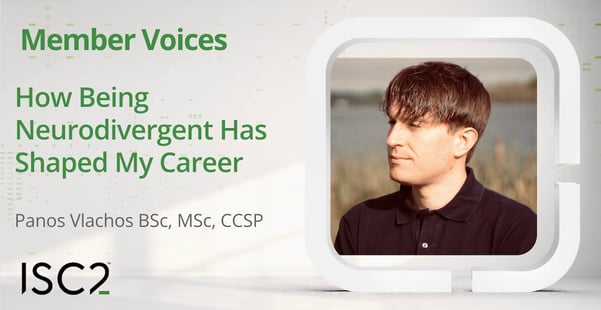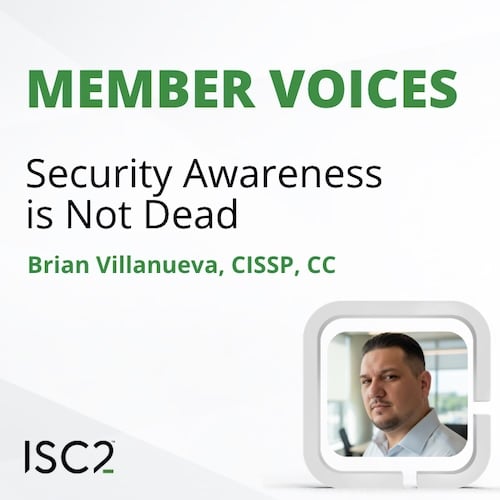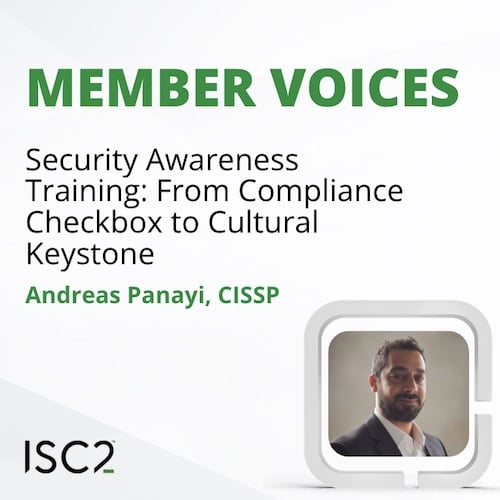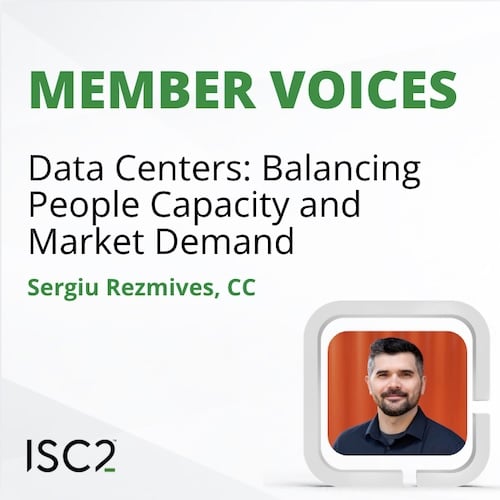Panos Vlachos, BSc, MSc, CCSP, is a lead information security engineer, a PhD researcher in post-quantum cryptography and a proud neurodivergent professional with strong traits of both Autism Spectrum Condition and ADHD – often referred to as “AuDHD”.
 Disclaimer: The views and opinions expressed in this article belong solely to the author and do not necessarily reflect those of ISC2.
Disclaimer: The views and opinions expressed in this article belong solely to the author and do not necessarily reflect those of ISC2.
I’ve spent nearly a decade in the ICT industry, with the last four years focused on Information Security. I hold a BSc in Computer Science and Telecommunications, a MSc in Information Security, and the ISC2 Certified Cloud Security Professional (CCSP) certification. I want to share how being neurodivergent has shaped my career, challenged me and ultimately empowered me to advocate for inclusion in cybersecurity.
Discovering Cybersecurity
My journey into cybersecurity began during a walk in the Greek countryside, in my final school year, when my father introduced me to the concept of cybersecurity. Back then, I didn’t even own a computer, making Informatics an unknown area to me, so I had no idea how complex and essential information systems are in our daily lives, or how critical it is to secure them.
That moment sparked a lifelong fascination, that led me to computer science as a subject. I was drawn to the structured yet creative nature of it. Programming languages offer clarity and predictability – qualities I needed in a world that often felt too overwhelming and chaotic. Computers follow rules and, given a clear set of instructions, the outcome is predictable and reproducible. That sense of order offered me a sense of ease and calmness. At the same time, this was a great outlet for my creative and problem-solving side, which kept me really engaged. Cybersecurity was one step further in my mind, as it requires deep understanding of how systems are designed, implemented and operated.
Thriving in a Technical Role
In my current role, I’m focused on secure software development lifecycle (SSDLC) and threat modelling work. My neurodivergence is often a superpower in this role. While focusing on a task can sometimes be difficult, once I enter a hyperfocus state – especially when investigating a problem or assessing a system – I tend to dive deep and do a very thorough and extensive research about it, exploring it from different angles, to get a detailed, yet holistic picture. This helps me maintain situational awareness, track attack surfaces, and identify weak spots others might miss.
The way my brain is wired allows me to notice patterns and anomalies that others might not. Whether it’s a misconfigured system, a subtle deviation in behavior, or a gap in a process, I tend to spot what doesn’t fit and spot it fast, which has helped me greatly, not only in my cybersecurity roles, but also as a software engineer.
Outside my technical work, I’m also a committee member of an internal-to-my-organization employee resource group focused on disability and neurodiversity. I really like having this role, as it allows me to be a voice for others like me who might not be as upfront, advocating for inclusive practices, adding my contribution in creating a workplace where people like me don’t have to mask who they are to succeed, as well as helping the wider community.
Overcoming Challenges
Like many neurodivergent professionals, I’ve faced challenges – especially around sensory sensitivities, memory and information processing. I process written information much more easily than verbal communication, so tools like closed captions and using AI to create meeting summaries help a lot. I also use practical strategies to manage sensory overload, like noise-canceling headphones, sunglasses and fidget tools. Music plays a core role in my daily life, both personally, but also professionally, helping me focus, escape, or regulate strong emotions.
One of the biggest risks of being neurodivergent in cybersecurity – or most workplace environments, really – is burnout. There are two key factors that I have personally identified that can lead to burnout: consistent masking and a racing mind – both extremely common in both Autism and ADHD. Cybersecurity is a field that demands constant learning, awareness and adaptability – whether that’s emerging technologies, threats and concepts. Add to that the pressure of having to behave like someone you are not, by either suppressing your stimming, forcing eye contact or following social scripts, in environments designed by and for neurotypicals, along with the mental load, is one of the biggest challenges. I cannot recall the number of times I’ve started my workdays in the past with a throbbing headache, just from navigating a noisy and sensory-overloading commute, trying to regulate my emotions without the tools or language to explain what I was going through. That friction can often spill into a person’s work and relationships, without the appropriate support.
Therapy has been extremely helpful and after a long time, I managed to recognize my emotional states at each given time, using my feelings as indicators and not as my reality. With support from people who understand, love and care for me deeply, I’ve learned to recognize my limits and act before I reach them. I’ve also learned to be more intentional about the challenges I take on. My impulsive, curious brain often pushes me toward new opportunities, but this side of my brain doesn’t look too far into the future, nor does it reflect on the past. It is focused on the dopamine of taking on a new challenge. Without foresight, that can lead to overcommitment and eventual collapse. Now, I try to balance ambition with sustainability, novelty with routine and chaos with order! That’s a lesson I learned the hard way and is still ongoing.
Coming to Terms with Neurodivergence
For most of my life, I felt different but couldn’t put my finger on exactly why. I struggled to retain spoken information, couldn’t maintain focus on discussions and topics I didn’t find interesting enough, zoned out a lot, had difficulty staying still, and often felt emotionally overwhelmed. Social interactions felt (and a lot of times still do) weird to me, with myself sometimes taking things too literally or coming off as rude or weird.
While therapy helped me dig deeper and get to know myself better, it was my wife (who happens to be a psychologist herself, as well as my biggest supporter) who suggested I began exploring the possibility of being neurodivergent. Initial assessments confirmed what I had long suspected. That realization was a turning point as it gave an explanation I had been longing for so long – some of my behaviors, thought patterns and ultimately my way of experiencing the world. It gave me the language, validation and a framework to better understand myself and cope with everyday life.
Advice for Neurodiverse Professionals
Cybersecurity is a field that rewards curiosity, adaptability and deep technical focus – traits many neurodivergent people naturally possess. If you’re just starting out, begin with the basics of understanding how systems are designed, built and operate. Explore as much as you can and maintain a curious mind, try different roles in different domains to map out your interests. Being the least experienced person in the room is what really teaches you things.
Most importantly, get to know yourself. When you understand how your brain works, you can build a life and a career that works with it – not against it. Learn your limits and understand how far you can stretch yourself before it becomes too much. Also, learn your needs and communicate them to your colleagues and circle. Our field can often be a rather welcoming area for neurodiverse people, mostly due to the soft skills that are required from cybersecurity professionals, such as the attention to detail, honesty, problem-solving, etc. At the same time, more awareness needs to be raised to the public about neurodiversity and burnout, so that the stigma that remains will be finally removed and people can come as they are, without having to put extra energy on masking.
Panos Vlachos, BSc, MSc, CCSP, is an information security expert with a strong foundation in software engineering. He has experience working on system design, implementation, and development of back-end systems, APIs, and web services.
Related Insights


